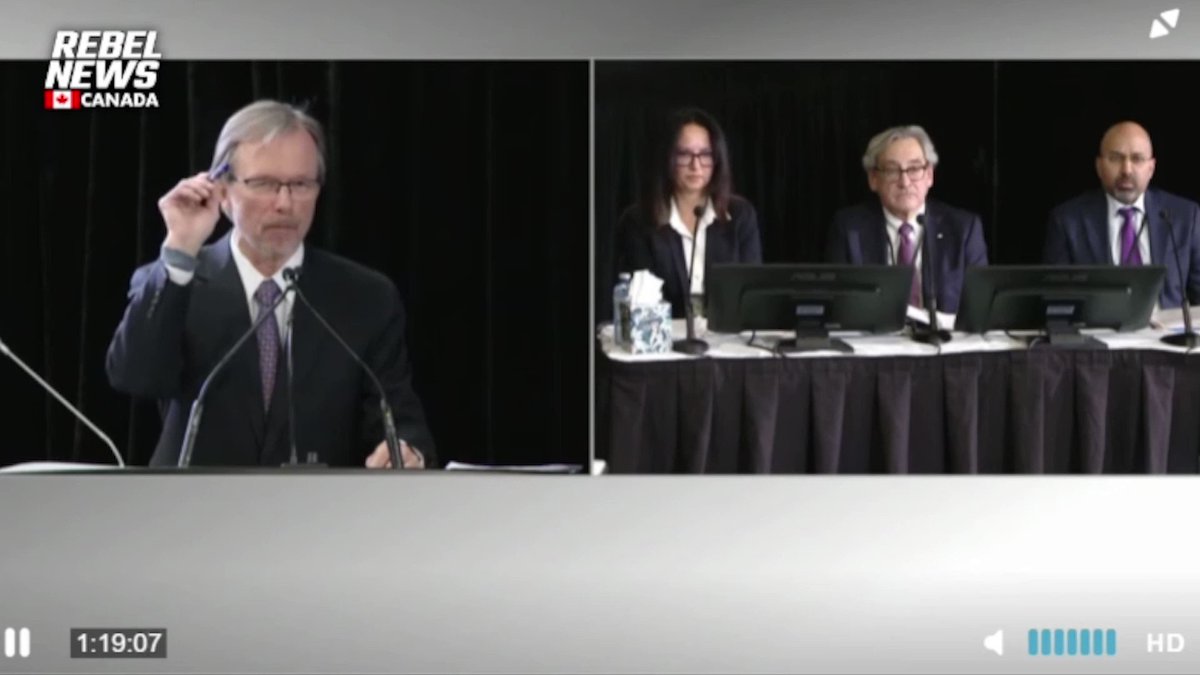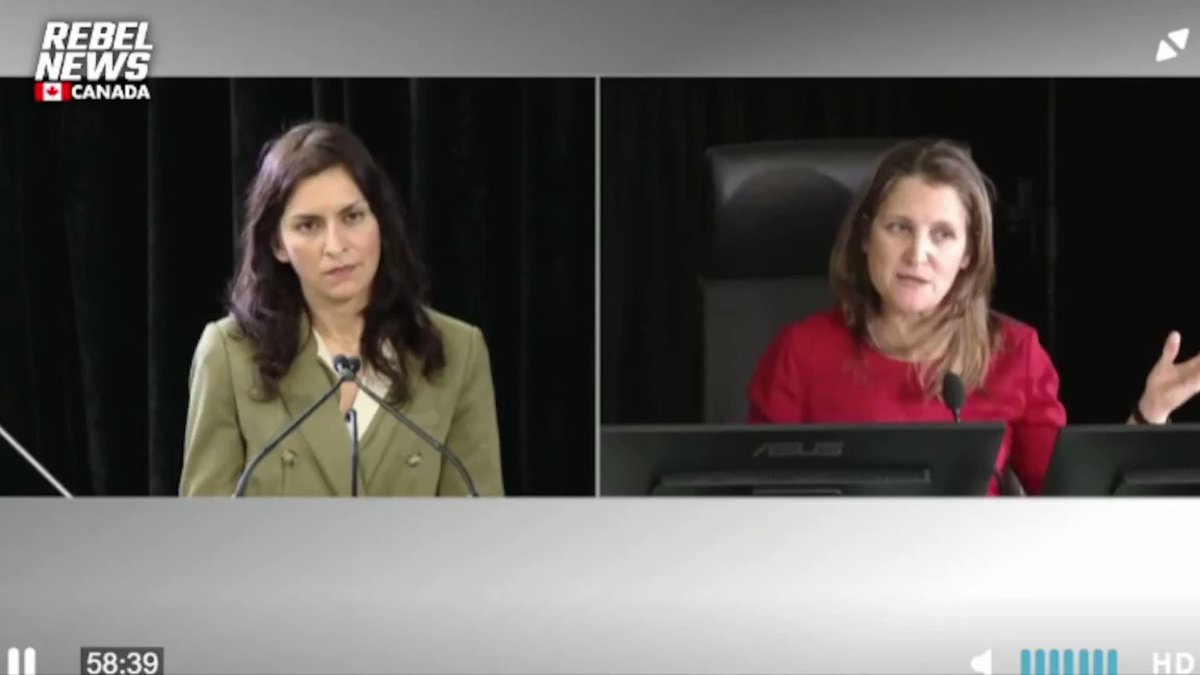Twenty plaintiffs targeted by the invocation of Emergencies Act claim the federal government, financial institutions, and law enforcement infringed their Charter rights.
An estimated $7.8 million in holdings belonging to convoy supporters had been seized in 2022.
https://www.rebelnews.com/freedom_convoy_supporters_sue_trudeau_and_cabinet_for_ordering_seizure_of_bank_accounts?utm_campaign=buzz_03_18_24&utm_medium=email&utm_source=therebel

Prime Minister Justin Trudeau and members of his Cabinet have been sued in the Ontario Superior Court of Justice Friday for their role in seizing bank accounts during the 2022 Freedom Convoy.
A group of 20 plaintiffs targeted by the extrajudicial measures of the Emergencies Act claim the federal government, financial institutions and law enforcement infringed their Charter rights.
Trudeau, his Deputy Prime Minister Chrystia Freeland, and former ministers Marco Mendicino and David Lametti are named as defendants in the lawsuit, including former RCMP commissioner Brenda Lucki, acting Ottawa Police commissioner Steve Bell, Canada’s five big banks, and several small regional banks and credit unions.
Calgary firm Loberg Ector LLP filed the lawsuit in the Ontario Superior Court of Justice, seeking millions of dollars in damages. Each plaintiff is seeking $2.2 million in damages.
Plaintiffs are seeking $1,000,000 in punitive damages for “the malicious, reprehensible, and high-handed misconduct of the Defendants,” along with $500,000 in damages for the breach of contract and the seizure of bank accounts.
The statement of claim alleges the seizure of bank accounts infringed their section 2(b) and section 8 Charter rights — their freedoms of expression and protection against unlawful search and seizure. They seek an additional $500,000 in damages for the breach of Charter rights, plus $200,000 in damages for “injurious defamation” and “assault and battery”.
– – –
According to correspondence between Ben Chin and Tyler Meredith, both senior advisers to the Prime Minister, the Prime Minister’s Office applied pressure on banks to seize Freedom Convoy assets as early as February 7, 2022.
“But we are talking with banks and insurance companies about how they can act on their own and what helpful signals we might [be] able to send,” reads one text.
However, Canadian banks and insurers resisted taking action against their clients for political reasons.
The text exchange entered into evidence at the Public Order Emergency Commission (POEC), which reviewed the appropriateness of invoking the Emergencies Act to deter convoy protests.
The Trudeau Liberals invoked the Emergencies Act one week later.
On February 14, 2022, Trudeau permitted the warrantless seizure of bank accounts and assets of convoy supporters, amid a weeks-long, trucker-led peaceful protest against draconian COVID mandates.
At the time, then-justice minister David Lametti claimed the Emergencies Act was a “proportionate measure to restore order” against the “illegal blockades and occupations [that] threaten the safety of Canadians.”
In the matter of Edward Cornell et al v Justin Trudeau et al, the plaintiffs, including participants and supporters of the 2022 Freedom Convoy, challenged the federal government’s unconstitutional actions as outlined in the Emergencies Act.
It described the use of emergency powers against the peaceful Freedom Convoy as “one of the largest and most egregious collective breaches of Charter rights in Canadian history.”
“The scope of the unlawful searches and seizures was astonishingly broad, disproportionate, ill-conceived, and contrary to the core constitutional values of all Canadians in our free and democratic society,” reads the statement of claim.
According to figures obtained through an access-to-information request by Blacklock’s Reporter, an estimated $7.8 million in holdings belonging to convoy supporters had been seized by 267 bank accounts and 170 bitcoin wallets in 2022.
“We primarily relied upon the names provided by the RCMP but there were obligations under the order separate that required banks to make their own determinations,” testified Angelina Mason, general counsel for the Bankers Association, at a March 7, 2022 hearing at the Commons finance committee.
“Were there accounts of individuals frozen that did not appear on a list of names submitted by banks to the RCMP?” asked New Democrat MP Daniel Blaikie. “Yes,” replied Mason

“The RCMP offered to act as a conduit of information,” said the Inquiry, who shared the list with the Bank of China, State Bank of India, BNP Paribas of France, Citibank of New York, Habib Bank of Pakistan, Hana Financial Group of South Korea, ICICI Bank Limited of India, Mizuho Financial Group of Japan and Wells Fargo & Company of San Francisco.
The federal police service also distributed the list of Convoy supporters to several stock brokerages, investment firms, and the now-defunct Silicon Valley Bank of Santa Clara.
Federal law stipulates that banks can only cancel account holders in cases of alleged criminality. Section 627.18.1 of the Bank Act permits banks not to “open a retail deposit account on the request of a natural person” in cases of criminality, fraud or “physical harm, harassment or other abuse.”
In February 2022, the Canadian Bankers Association acknowledged that depositors could be flagged for life, reported Blacklock’s Reporter.
Mason clarified that once an account is frozen and “eventually unfrozen,” the holder’s file would indicate “a freeze had taken place.”


In addition to financial damages, the plaintiffs are seeking a declaration that the defendants acted unlawfully when they ordered the seizure of bank accounts.
In January, Federal Court Justice Richard Mosley published his decision on its use, concluding the federal proclamation “does not bear the hallmarks of reasonableness – justification, transparency, and intelligibility.”
Soon after, Freeland announced the federal government would appeal the decision, which remains before the Appeals Court.
In September 2022, the Deputy Prime Minister told the POEC inquiry that seizing bank accounts was an “incentive” for the protests to end.
The House of Commons upheld their use of emergency powers earlier that year by a 185 to 151 vote.
Although the inquiry concluded that Trudeau and his Cabinet met the legal threshold for using the Emergencies Act, it bears no legal standing.